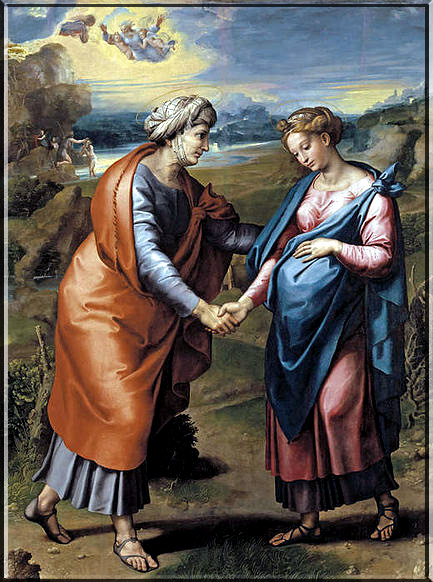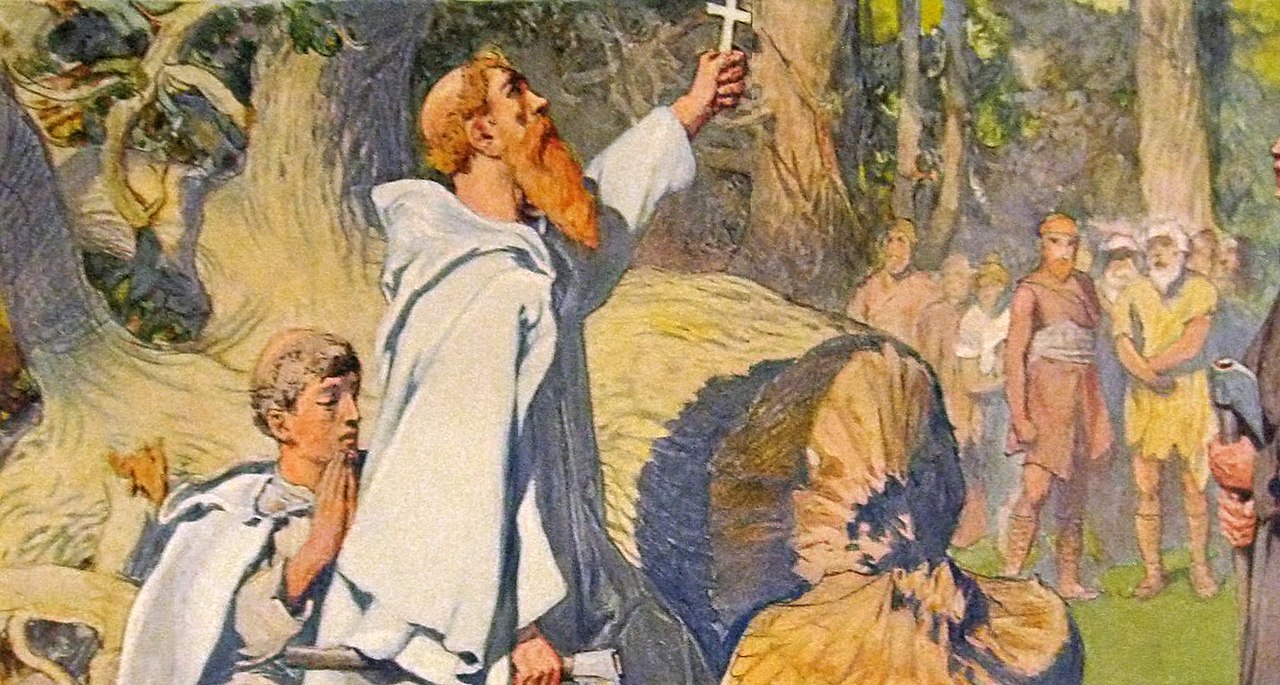
The Visitation by Raphael
Today is the Eve of Christmas! Traditionally, the vigil of such a significant feast was one of prayer and fasting. The Catholic fasts before he feasts!
Fisheaters: Christmas Eve & Christmas
The Golden Legend of Blessed Jacobus de Voragine, OP, observes about this time of year, the end of Advent:
"As touching the coming of our Lord in our bodily flesh, we may consider three things of this coming, that is to wit, the opportunity, the necessity and the utility.
The opportunity of coming is taken by the reason of the man that first was vanquished in the law of nature of the default of the knowledge of God, by which he fell into evil errors, and therefore he was constrained to cry to God: Illumina oculos meos, that is to say, Lord, give light to mine eyes. After, came the law of God, which hath given commandment in which he hath been overcome of impuissance, as first he hath cried: There is none that fulfilleth but that commandeth. For there he is only taught, but not delivered from sin, ne holpen by grace, and therefore he was constrained to cry: There lacketh none to command, but there is none that accomplished the commandment. Then came the Son of God in time when man was vanquished of ignorance and impuissance. To that if he had so come tofore, peradventure man might say that by his own merits he might have been saved, and thus he had not been bound to yield thanks to God.
The second thing that is shown us of this coming is the necessity by reason of the time, of which the apostle Paul speaketh, ad Galatas the fourth chapter: At ubi venit plenitudo temporis, when the plentitude or full time of the grace of God was ordained, then he sent his Son that was God and Son of the virgin and wife which was made subject to the law. To that, that they be subject to the law he bought them again, and were received sons of God by grace of adoption. Now saith S. Austin that many demand why he came not rather. He answered that it was because that the plentitude of time was not come, which should come by him, that all things were ordained and made, and after when this plentitude of time came, he came that of time past hath delivered us, to that we shall bedelivered of time, we shall come to him whereas no time passeth, but is perpetuity. The third thing that is showed to us of this coming is the utility and profit that cometh for the cause of the hurt and sickness general. For sith the malady was general, the medicine must be general, whereof saith S. Austin that: Then came the great medicine, when the great malady was through all the world.
Whereof the holy Church remembereth in the seven anthems that be sung before the nativity of our Lord, where the malady is showed in divers manners, and for each demandeth remedy of his malady of prisoner out of the prison that sitteth in darkness and shadow of death. For they that have been long in prison and dark places may not see clearly, but have their eyes dim. Therefore, after we be delivered from prison, it behoveth that our eyes be made clear and our sight illumined for to see whither we should go, and therefore we cry in the fifth anthem: O Oriens splendor lucis eterne, veni et illumina sedentes in tenebris et umbra mortis, O Orient that art the resplendour of the eternal light, come and illumine them that sit in darkness and shadow of death, and if we were taught, lighted, unbound, and bought, what should it avail to us but if we should be saved? And, therefore, we require to be saved, and therefore we say in the two last anthems, the sixth and the seventh; when we cry: O Rex gentium, veni et salva hominem quem de limo formasti, O thou King of peoples come and save the man that thou hast formed of the slime of the earth; and in the seventh: O Emmanuel rex et legifer noster veni ad saluandum nos, domine deus noster, O Emmanuel that art our King, and bearer of our law, our Lord, our God, come and save us.
The profit of his coming is assigned of many saints in many manners, for Luke saith in the fourth chapter that our Lord was sent and came to us for seven profits, where he saith: The Spirit of our Lord is on me, which he rehearseth by order; he was sent for the comfort of the poor, to heal them that were sick in sin, to deliver them that were in prison, to teach them that were uncunning. To forgive sins, to buy again all mankind. And for to give reward to them that deserve it.
And S. Austin putteth here three profits of his coming and saith: In this wretched world what aboundeth but to be born to labour and to die. These be the merchandise of our region, and to these merchandises the noble merchant Jesus descended. And because all merchants give and take, they give that they have and take that they have not; Jesu Christ in this merchandise gave and took, he took that which in this world aboundeth, that is to wit, to be born to labour and to die, he gave again to us to be born spiritually, to rise and reign perdurably. And he himself came to us to take villanies and to give to us honour, to suffer death and to give us life, to take poverty and to give us glory.
S. Gregory putteth four causes of the profit of his coming: Studebant omnes superbi de eadem stirpe progeniti, prospera vitæ præsentis appetere, adversa devitare, opprobria fugere, gloriam sequi: They of the world, in their pride descended of the same lineage, studied to desire the prosperity of this present life, to eschew the adversities, to flee the reproofs and shames and to ensue the glory of the world. And our Lord came incarnate among them, asking and seeking the adversities, despiting the prosperities, embracing villanies, fleeing all vain glory. And he himself which descended from glory, came, and he being come, taught new things, and in showing marvels suffered many evils.
S. Bernard putteth other causes, and saith that, we travail in this world for three manner of maladies or sickness, for we be lightly deceived, feeble to do well, and frail to resist against evil. If we entend to do well we fail, it we do pain to resist the evil, we be surmounted and overcome; and for this the coming of Jesu Christ was to us necessary. To that he inhabiteth in us, by faith he illumineth our eyes of the heart, and in abiding with us he helpeth us in our malady, and in being with us he defendeth our frailty against our enemies." (Golden Legend, Advent of the Lord)

St. Boniface and Donar's Oak, by Doepler
By now, most of you have also put up your Christmas trees. The tree is a beautiful symbol of the season. The evergreen leaves remind us of the eternal life won by our great saviour, and the shape points us to heaven.
We might recall, too, the great story of St. Boniface (+754AD), Apostle to the Germans, felling the great oak, sacred to the pagans, recalled in the Life of St. Boniface by Willibald:
"Now many of the Hessians who at that time had acknowledged the Catholic faith were confirmed by the grace of the Holy Spirit and received the laying-on of hands. But others, not yet strong in the spirit, refused to accept the pure teachings of the church in their entirety. Moreover, some continued secretly, others openly, to offer sacrifices to trees and springs, to inspect the entrails of victims; some practiced divination, legerdemain, and incantations; some turned their attention to auguries, auspices, and other sacrificial rites; while others, of a more reasonable character, forsook all the profane practices of the Gentiles [i.e., pagans] and committed none of these crimes. With the counsel and advice of the latter persons, Boniface in their presence attempted to cut down, at a place called Gaesmere, a certain oak of extraordinary size called in the old tongue of the pagans the Oak of Jupiter. Taking his courage in his hands (for a great crowd of pagans stood by watching and bitterly cursing in their hearts the enemy of the gods), he cut the first notch. But when he had made a superficial cut . Suddenly, the oak's vast bulk, shaken by a mighty blast of wind from above crashed to the ground shivering its topmost branches into fragments in its fall. As if by the express will of God (for the brethren present had done nothing to cause it) the oak burst asunder into four parts, each part having a trunk of equal length. At the sight of this extraordinary spectacle the heathens who had been cursing ceased to revile and began, on the contrary, to believe and bless the Lord. Thereupon the holy bishop took counsel with the brethren, built an oratory from the timber of the oak and dedicated it to Saint Peter the Apostle." (Willibald: Life of St. Boniface)
It is said that St. Boniface also pointed to a diminutive conifer, using its size, evergreen leaves, and triangular form, as a contrast to the oak of the pagans. Here's hoping you don't have a Christmas oak!
Here is a little article, from L'Osservatore Romano, on the subject: The Christmas Tree: Legends, Traditions, History in L'Osservatore Romano

Cone and foliage of the Abies fraseri.
["Abies fraseri cone". Licensed under CC BY-SA 3.0 via Commons]
This blogger's family tree is a Fraser Fir (Abies fraseri), a species of conifer that seems now to dominate the Christmas tree selections in this, the Southern, part of the United States. It is a native fir of the southern Appalachians, named for the Scottish botanist, John Fraser (+1811AD), who discovered it and brought some specimen back to Europe. In parts of the mountains, it is known as "she-balsam." Interestingly, it is the only species of fir native to the Great Smoky Mountains National Park. It is rather similar in form and appearance to the more widely ranging Balsam Fir (Abies balsamea) of the great north woods.

Native range of the Fraser Fir (Abies fraseri)
The rather restricted native range of the Fraser Fir has now been rather well supplemented by its commercial use. It is no wonder, it is a delightful tree with excellent form, pleasant fragrance, and good needle retention qualities even after it begins to dry.
Whatever manner of tree you may or may not have, may your spiritual life be evergreen, and surely directed to the God in heaven. My your Christmas Eve be blessed, and your heart prepared to receive the Holy Saviour!
Live well!
No comments:
Post a Comment